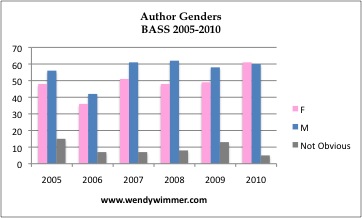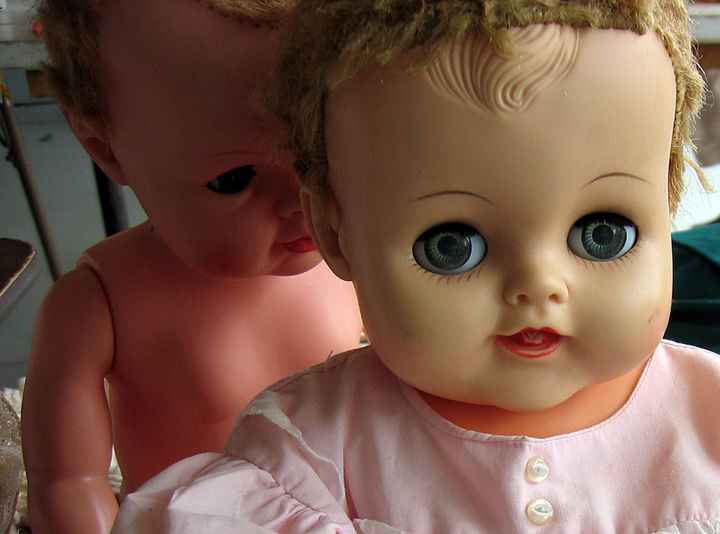This post from Max Barry is too good to not share. It starts like this:
This has been a great year for male writers, with women shunted aside for major prizes and all-new hand-wringing about why it is so. Because, I don’t know if you’ve noticed, but male writers get taken more seriously. Also, stories about men, even if written by women, are considered mainstream, while stories about women are “women’s fiction.” This despite the fact that women read more than men, and write more, and are over-represented generally throughout publishing.
Let’s go to V.S. Naipaul for the sound byte:
I read a piece of writing and within a paragraph or two I know whether it is by a woman or not. I think [it is] unequal to me. And inevitably for a woman, she is not a complete master of a house, so that comes over in her writing too.
I mentioned this particular quote to a fairly successful male writer last month and he took a little umbrage to the suggestion that women writers are being underrepresented by the award and anthology circuits. Being a white guy writer, he has a harder time seeing the bias. I encouraged him to prove me wrong with cold hard facts, sir, and I would join his umbrage! Umbrage for all! Wait, I have some facts, I can whip up a handy graph right this minute from the last 6 years of Best American Short Stories data.

So much for the umbrage.
(We both agreed that V.S. Naipaul is cranky and old and probably smells like couch cushions.)
Thankfully, my generation of male writers isn’t suffering from Naipaul-esque sentiments, or at least they aren’t saying them out loud, but I have a hard time understanding why this divide exists.
Then I polled a few writers on who their favorite authors were, and the female writers answered with a mix of male and female authors while the male writers (with one single exception) replied with a list of male names. And these are men whose work I enjoy and who, if asked, would likely label themselves as being open-minded to equality, would vehemently defend a female writer’s work and might even use the term “feminist”.
Here’s a random listing of the favorite authors on five Fictionaut profiles, which is a bit more formal and premeditated than my informal poll at Writer’s Camp. Can you guess which of these respondents are male and which are female? Click the * to see if you guessed right.
Ernest Hemingway. Raymond Carver. T.S. Eliot. William Carlos Williams. Charles Bukowski. a few Billy Collins. a few Jack Gilbert. Walt Whitman. Emily Dickinson. Roberto Bolano. *
I, Lucifer by Glen Duncan is one of my favorite books. Also, The Once and Future King written by T. H. White, Chuck Palahniuk, Raymond Carver, Tobias Wolfe, Anne Sexton, Jim Morrison, David Mamet and many many more. *
I love James Salter, Charles Baxter, Mona Simpson (mostly for her short story “Lawns”), Samantha Hunt, Amy Bloom, Maile Meloy. I buy lit journals with any pocket money I ever have, and Lolita will probably be my favorite novel forever and always.*
Iain Banks, Candas Jane Dorsey, Margaret Atwood, Jonathan Carroll.*
So many: Aimee Bender, Louise Erdrich, Jayne Anne Phillips, Kurt Vonnegut, N. Scott Momaday, Francine Prose. Some favorite books: The Particular Sadness of Lemon Cake, Tinkers, Four Corners, The Great Gatsby, on and on…*
Did you guess right?
This has much to do with what Max Barry called the problem of Dogs and Smurfs.
Male is default. That’s what you learn from a world of boy dogs and Smurf stories. My daughter has no problem with this. She reads these books the way they were intended: not about boys, exactly, but about people who happen to be boys. After years of such books, my daughter can happily identify with these characters.
And this is great. It’s the reason she will grow into a woman who can happily read a novel about men, or watch a movie in which men do all the most interesting things, without feeling like she can’t relate. She will process these stories as being primarily not about males but about human beings.
Except it’s not happening the other way. The five-year-old boy who lives up the street from me does not have a shelf groaning with stories about girl animals. Because you have to seek those books out, and as the parent of a boy, why would you? There are so many great books about boys to which he can relate directly. Smurf stories must make perfect sense to him: all the characters with this one weird personality trait to distinguish them, like being super brave or smart or frightened or a girl.
I get it now. Women writers are Smurfette, in a sea of dogs who are male by default. George Elliott figured this out years ago, this is no surprise.
Remember my informal poll of sensitive male writer types? It’s worth noting that on Max Barry’s list of 20 favorite books, there are but a few Smurfettes.

4 Comments
I feel like this makes so much sense to me. In the past year I’ve made a conscious effort to seek out and read more women writers only to recently look at my ipod and realize that 90% of the musicians I listen to are male. I’m looking forward to changing this as well.
I’ve always thought there was something creepily retrograde about the Smurfs. The John Stewart Show and the PEN Faulkner Prize are just two random examples of the Smurfette Syndrome. Add Hollywood and The Onion to the pile.
Great posts about BASS gender issues. I was curious about BASS inclusions myself and I noticed that though the most recent editions of BASS were about equal in terms of men and women writers, I noticed that there was a definite skew in the sex of the short story characters AND the point-of-view. The women writers in the particular edition I analyzed tended to favor a third person POV. I thought that was definitely interesting. Also, my friend Rebecca Makkai has had four consecutive BASS inclusions. Out of those four, three have male protagonists…
Again, getting here late.
I don’t see why this matters. All right, suppose you’re Taken Seriously. What do you get? Well, considering the money involved in literary fiction, my guess is it comes in right around $0. I suppose getting taken *really* seriously might lead to panel invitations, which translates to free drinks; a chat with people you can talk to other times, too; and maybe, oh, a couple hundred as an honorarium, maybe. And the unvarnished pleasure of talking in front of *live misbuttoned and lankhaired people*, who will undoubtably ask earnest questions that go sailing over the point of whatever it is you’ve been talking about.
Or maybe it’s that you want to be taken seriously by some curdled university-press editor who lives for his annual visits to the professional dominatrix, the very thought of which makes him feel appallingly naughty, and otherwise contents himself with dinner parties where home historical restoration is always a conversational smash hit. Bonus points if someone works in the word “balustrade”, negative points for “soffit”.
Or maybe you’re anxious to spruce up your cv with critically well-received work, because you burn with a pure flame to read thousands of talent-free undergraduate stories about high-school golf championships and suicide. For almost no money.
You do understand that all this prizey-best-of stuff was invented by the men so that they’d have a mountain to knock each other off, right? These are American men who shlump around with no money writing stories; they’ve got to redeem themselves socially somehow and have a hook if they want to get laid, and here you go: prizes. Best Of. I wouldn’t get too excited about it.
One Trackback/Pingback
[…] community: the potential for bias against writers who are women. I posted this graph in the a previous entry, but since it’s handy, let’s take a look at it […]